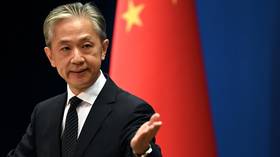US State Department’s new anti-China unit is a waste of time and resources
China House is another taxpayer-funded initiative designed to antagonize Beijing, instead of working on reconciliation for the common good

The US State Department announced on December 16 the launch of a so-called ‘China House’ unit, an internal reorganization designed to help sharpen policymaking against Beijing, Washington’s primary geopolitical rival.
This unit, officially known as the Office of China Coordination, is supposedly going to be the centerpiece of the administration of President Joe Biden’s policy toward Beijing and will employ up to 60 or 70 people specifically for furthering Washington’s competition vis-a-vis China.
According to an official preview that US officials gave to Politico, the administration wants to streamline what it sees as a bureaucracy that’s currently not fast enough to meet the challenges of the geopolitical rivalry. Inevitably, it shows that the US wants to create a more thorough diplomatic machine to push this rivalry up a new notch instead of focusing on much-needed cooperation as the all-important US-China relationship sours.
Prior to the rollout of this new entity, the US had been pooling resources from a number of disconnected agencies and units within the State Department. The unit will be headed by Rick Waters, a deputy assistant secretary who will now be its inaugural coordinator. But China House has not been described as a game-winning solution but rather as a crucial part of a much broader effort to combat Beijing’s growing influence around the world.
Of course, such China-oriented units within the US government are not exactly new. We know that in October 2021, the Central Intelligence Agency (CIA) created a so-called China Mission Center and, likewise, in February of the same year, the Department of Defense formed a China Task Force. Each of these essentially amounts to the same thing: boosting internal coordination within various government agencies to drive up the perceived China threat and attempt to contain Beijing.
While the US has in various formats sworn that it is not seeking a new Cold War against China and wants to cooperate on key points of mutual benefit, such actions tell a different story. That story being that the US is hellbent on confrontation first and foremost. For its part, China has highlighted the need for win-win cooperation, of which there are countless possible examples.
For instance, the US Department of Energy announced last week that scientists at the National Ignition Facility had reached a key breakthrough in nuclear fusion. Such an advance had eluded nuclear scientists for almost 60 years, but its rollout to the US (and global) energy portfolio, as it currently stands, will probably not have any significance until the 2060s or 2070s because of engineering challenges. However, with China’s world-class engineering talent, Beijing could lend a much-needed hand in helping develop this technology for the real world. Such cooperation could greatly expand the world’s arsenal in the fight against climate change and help the US and other countries reach carbon neutrality at or before their intended deadlines.
The US could also find new avenues to cooperate on trade to help create American jobs via China. In January of this year, it was reported that China helped not only save 9,000 existing jobs in the Boston area but also created a projected 400,000 more over the next 20 years after the China Ocean Shipping Company opened direct vessel service from China to the Port of Boston. Both of these examples, one hypothetical and one very real, highlight what a China House could focus on – helping American workers and the world – rather than drumming up competition between the world’s two most important countries.
As it stands, China House is shaping up to be not all that productive. It will be one of several China-oriented agencies within the federal government blob that will compete for clout and funds, as we have seen take place in countless other examples over the years. This will essentially be a money pit for US taxpayers that will not yield any tangible results to benefit average people’s lives but will only serve to demonize China in the international public eye, more than likely unsuccessfully. The unit will almost certainly be a waste of time and resources that the US could direct toward more productive activities that benefit both sides.
No doubt, China House will further deteriorate relations between the two sides. It will throw gasoline on an already raging fire and further fray an already damaged connection between the two countries. The administration should really think twice about the goals of China House and, one might hope, direct these resources towards more productive ends. As the most important diplomatic relationship in the world, China and the US have much that they could achieve together rather than wasting time and energy in fruitless competition.
The statements, views and opinions expressed in this column are solely those of the author and do not necessarily represent those of RT.
https://www.rt.com/news/568737-us-anti-china-unit/




0 Comments:
Post a Comment
Subscribe to Post Comments [Atom]
<< Home